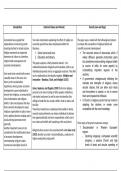Introduction Informal (Values and Morals) Formal (Laws and Regs)
Economists have argued that Two main mechanisms explaining the effect of religion on The paper uses a model with the following key features
explanations of economic growth economic growth have been emphasised within the to analyse the coevolution of religious beliefs and
should go further to include culture. literature: scientific-economic development:
Religion represents an important 1. Social norms and trust. The recurrent arrival of discoveries which, if
dimension of culture as, therefore, 2. Education and literacy. widely diffused, generate productivity gains
religion holds consequences for but sometimes erode existing religious beliefs
This paper explores a third potential channel – the
economic development. (a source of utility for some agents) by
relationship between religiosity and innovation, both as an
individual propensity and as an aggregate outcome. They find contradicting important aspects of the
One needs to be careful with reverse doctrine.
such a relationship to be robustly negative. (Religion and
causality issues in this area. One A government, endogenously reflecting the
Innovation – Benabou, Ticchi, and Vindigni (2015))
theory is the secularisation interests and strengths of religious versus
hypothesis; where greater economic secular classes, that can allow such ideas
Guiso, Sapienza, and Zingales (2003) find more religious
development causes individuals to and innovations to spread, or act to censor
persons to be more trusting (of other people, institutions,
become less religious, as measured by them and impede their diffusion.
and market outcomes) as well as more trustworthy (less
church attendance and religious A Church or religious sector that can invest in
willing to break the law, accept a bribe, cheat on taxes, and
beliefs. It also encompasses the idea adapting the doctrine or render more
the like).
that economic development causes compatible with the new knowledge.
Theoretical models have emphasised how beliefs in divine
religious organisations to play a lesser
rewards and punishments can induce individuals to behave
role in political decision-making and in
less opportunistically and more cooperatively, which can in
social and legal processes more
turn make such beliefs self-sustaining at the social level. Three types of long-term outcomes emerge:
generally.
Another important nuance to be 1. ‘Secularisation’ or ‘Western European’
Religiosity thus seems to be associated with what Guiso et al. regime.
considered is the multifaceted nature
(2003) describe as certain ‘societal attitudes…conducive to - Declining religiosity, unimpeded scientific
of economic development,
higher productivity and growth’.
encompassing rising per capita progress, a passive Church and high
incomes but also higher levels of levels of taxes and secular spending or
, education, urbanisation, and life The ultimate driver of long-run growth is technical progress redistribution.
expectancy, and lower levels of and more generally the whole spectrum of innovation: from 2. A ‘Theocratic’ regime.
fertility. The effect of economic advances in basic science to the diffusion of new - Knowledge stagnation, extreme religiosity,
development on religiosity likely technologies (Mokyr, 2004), economic practices and even a Church that makes no effort to adapt
depends on the specific aspect of social change, such as the inclusion of women in production since its beliefs are protected by the state,
development, for example, more and idea-creation. and high taxes but now used to subsidise
education means something different It is therefore equally important to examine the extent to the religious.
from lower fertility. which religious beliefs, values, and institutions may be 3. ‘American’ Regime (Inbetween 1 and 2).
Uses instrumental variables. conducive or detrimental to creativity and innovation. Doing - Combines unimpeded scientific progress
The secularisation hypothesis remains so means, in a sense, revisiting with modern methodologies and stable religiosity within a range where
controversial, and an important the age-old theme of religion’s often tense relationship with the state does not block new knowledge
competing theory focuses on ‘market’ science, free thought and disruptively novel ideas. and the religious sector finds it worthwhile
or ‘supply-side’ forces. Such an to invest in doctrinal adaption.
approach downplays the role of Benabou, Ticchi, and Vindigni (2013): across countries and - Features lower taxation with specific
economic development and other across US states, there is a significant negative relationship exemptions or policies benefiting religious
‘demand factors’ for religion and between religiosity and innovation, where the latter is
activities and citizens.
focuses instead on competition measured by log patents per capita. These findings are
- A rise in income inequality can occur,
among religion providers. A greater robust.
leading the rich to form a ‘Religious-Right’
diversity of religions available in a
alliance with the religious poor and start
country or region is thought to For two of the three attitudinal variables, all five measures of
blocking belief-eroding discoveries and
promote greater competition, hence, religiosity are consistently associated with more negative
ideas.
a better quality religion product, and views of scientific progress.
hence, greater religious participation Someone who identifies as a Religious Person, or who reports
and beliefs. a greater Importance of Religion, Importance of God, or Chaves and Cann (1992) found that greater state
The extent of religious diversity and Church Attendance, is significantly more likely to think that regulation of religion was argued to decrease the
competition are thought to depend ‘we depend too much on science and not enough on faith’ efficiency of religion providers and, therefore, to
on how the government regulates the and that these ‘make life change too fast’. generate lower rates of church attendance. However,
market for religion. E.g., the existence For whether the ‘world is better off because of science and state religion also typically involves subsidies, such as
of an established state church – as in technology’, in contrast, there are varied results in sign payments to church employees, and the collection of
Scandinavia – is viewed as one source across measures of religiosity and are generally insignificant. taxes dedicated to church uses. Economic reasoning




